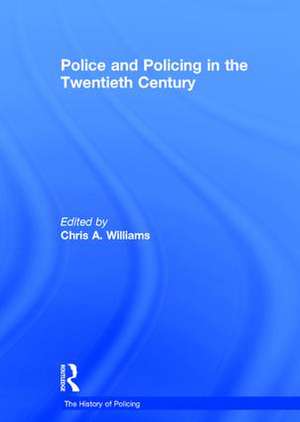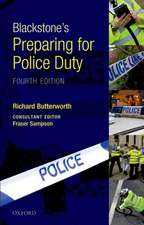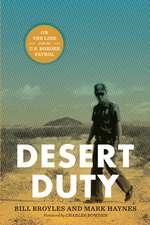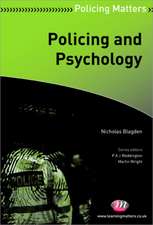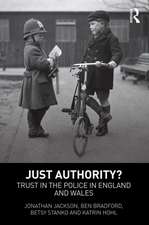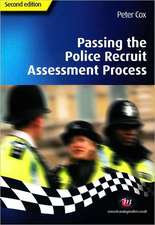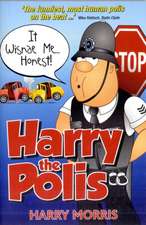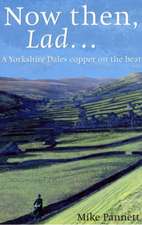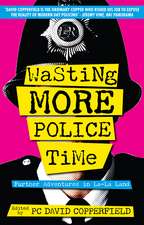Police and Policing in the Twentieth Century: The History of Policing
Editat de Chris A. Williamsen Limba Engleză Hardback – 18 mar 2011
Preț: 1473.56 lei
Preț vechi: 2052.69 lei
-28% Nou
Puncte Express: 2210
Preț estimativ în valută:
281.96€ • 295.18$ • 233.31£
281.96€ • 295.18$ • 233.31£
Carte tipărită la comandă
Livrare economică 07-21 aprilie
Preluare comenzi: 021 569.72.76
Specificații
ISBN-13: 9780754629542
ISBN-10: 0754629546
Pagini: 536
Dimensiuni: 169 x 244 x 39 mm
Greutate: 1.2 kg
Ediția:1
Editura: Taylor & Francis
Colecția Routledge
Seria The History of Policing
Locul publicării:Oxford, United Kingdom
ISBN-10: 0754629546
Pagini: 536
Dimensiuni: 169 x 244 x 39 mm
Greutate: 1.2 kg
Ediția:1
Editura: Taylor & Francis
Colecția Routledge
Seria The History of Policing
Locul publicării:Oxford, United Kingdom
Cuprins
Contents: Introduction; Part I How Police Were Organised: Rotten boroughs: the crisis of urban policing and the decline in municipal independence 1914-64, Chris A. Williams; Some reflections on the report of the Royal Commission on the Police, Jenifer Hart; The independence of Chief Constables, Bryan Keith-Lucas. Part II How Technology Changed Policing: 'Mother, what did policemen do when there weren't any motors?' The law, the police and the regulation of motor traffic in England, 1900-1939, Clive Emsley; Traffic, telephones and police boxes: the deterioration of beat policing in Birmingham, Liverpool and Manchester between the World Wars, Joanne Klein; Policing, planning and the regulation of traffic in post-war Leicester, Shane Ewen; Police surveillance and the emergence of CCTV in the 1960s, Chris A. Williams. Part III What Police Did: The 'ghost squad': undercover policing in London, 1945-49, Mark Roodhouse; Crime does not pay. Thinking again about detectives in the first century of the Metropolitan Police, R.M. Morris; The police and the people: gambling in Salford, 1900-1939, Andrew Davies; Containment: managing street prostitution in London 1918-1959, Stefan Anthony Slater; 'The coffee club menace': policing youth, leisure and sexuality in post-war Manchester, Louise A. Jackson. Part IV Who Police Were: A portrait of a novice constable in the London Metropolitan Police c.1900, Haia Shpayer-Makov; Street, beat and respectability: the culture and self-image of the Victorian and Edwardian urban policeman, Mark Clapson and Clive Emsley; A policewife's lot is not a happy one: police wives in the 1930s and 1940s, Barbara Weinberger; 'Walking the streets in a way no decent woman should': women police in World War I, Philippa Levine; Care or control? The Metropolitan Women Police and child welfare, 1919-1969, Louise A. Jackson. Part V Crises of Policing: Blue-collar job, blue-collar career: policemen's perplexing struggle for a voice in Birmingham, Liver
Notă biografică
Chris A. Williams is Lecturer in History at The Open University, UK
Recenzii
'... to be welcomed not only by police historians but also by social historians, sociologists, criminologists...Anyone wishing to familiarize themselves with the current state of historical research into twentieth-century policing will do well to start here...This is a valuable collection of essays...' Twentieth Century British History
Descriere
Recent research has suggested that the label 'golden age' is an over-simplification of British policing between the mid-nineteenth century and the present. This volume reprints the classic articles which address issues such as: the structure and reform of the police organisation; the nature of the policing task; who carried out this task; and some of the crises and ongoing areas of concern faced by the police in this period.
